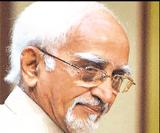
New Delhi, May 4: The consultation process over candidates for the presidential election made some headway on Thursday.
The Congress is understood to have informed its UPA partners that Vice-President Hamid Ansari was its preferred choice for the coveted post, followed by Finance Minister Pranab Mukherjee.
Senior party sources indicated that Congress would support the candidature of Ansari and added: “We feel we will not encounter any problem (with allies) with this choice. However, if there is any, then we are sure, there will be no such issues regarding Mukherjee.”
On a day when UPA’s unpredictable friend, Mamata Banerjee took the centre stage, meeting Sonia Gandhi and Samajwadi Party leader Mulayam Singh, the race to find the next incumbent of the Rashtrapati Bhavan got an unexpected twist, with a Congress spokesperson indicating that Finance Minister Pranab Mukherjee was not in the race.
Responding to questions from media, spokesperson Renuka Chowdhry quipped: “It will never be easy to leave Pranab da. He is such a valued person for us in the party. His contribution to the party cannot be even measured. For him, it will not seem to be fair...but he has such an active political mind. He is too involved and knows politics so well.”
The Congress, however, scrambled to clarify within hours. Party spokesman Rashid Alvi asserted: “The consultation process is on. No names have been finalised. Renuka Chowhury’s remarks show the importance of Pranabda. It does not mean he is ruled out for anything. It shows his importance for the party, Parliament and the country.”
Mamata seemed to have seized the initiative from Chaudhury’s statement as she said: “I think their party has already announced today that he is not (the candidate)," when asked by journalists whether Mukherjee was acceptable as a presidential candidate. She added: “I cannot say anything. Congress party has already announced their opinion... He belongs to the Congress party. Congress party will decide.”
The remarks of Chaudhury and Mamata created an impression during the day that incumbent vice president Hamid Ansari was ahead in the presidential poll race. Many wondered if Congress itself was not interested in fielding one of its seniormost leaders. However, some senior Congress leaders dismissed the suggestion.
Congress sources asserted that Mukherjee, UPA trouble shooter, was very much in the race and pointed out that Janata Dal (United) was likely to support the finance minister rather than a candidate picked up by the BJP-led NDA. “More allies from NDA supporting our candidate cannot be ruled out”, they added.
Sonia Gandhi, who held a meeting with Prime Minister Manmohan Singh with Mukherjee present, told reporters that there was time before a candidate was selected. Queried over "confusion" on names for presidential nominees, she said: “there is no confusion. Be patient, still there is time.”
Mamata, who met Gandhi for the first time after her election as CM a year ago, declined to speak to media after the meeting. It was, however, learnt that she pledged her support to the UPA candidate but felt that it would be better if the candidate was elected unanimously with support from across the political spectrum.
The West Bengal CM, who also met Samajwadi Party president Mulayam Singh Yadav, told reporters: “I would prefer a consensus. If this does not evolve, then of course there will be a contest. All options are open”. Asked if she would prefer Mukherjee, she quipped: “Congress has to take a decision first. He is after all a Congress leader. I can't interfere in any other party's internal affairs”. Mulayam said he was for a political person as president.






Comments
Add new comment